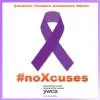In the time it takes to read this story, about 20 people will be assaulted, raped or killed by someone who claims to love them.
That’s the average number of people each minute who experience physical violence at the hands of an intimate partner in the United States, according to the National Coalition Against Domestic Violence. Each day, four women lose their lives to domestic violence, and Alabama has ranked among the top five states for women killed by male partners for three of the past five years.
“It’s a crime that affects everyone,” said Annetta Nunn, community outreach coordinator for domestic violence services at the YW. “Whenever I make a presentation, it never fails that someone in the room is a victim, has been a victim or knows a victim of domestic violence.”
October is National Domestic Violence Awareness Month, and as the largest provider of domestic violence services in the area, the YWCA Central Alabama will be doing its part to reach more victims, educate the public and offer help to those who are hurting. The YW offers a broad array of domestic violence services designed to help survivors become strong again so that they can rebuild their lives on a healthy foundation. In addition to a 24-hour crisis hotline, the YW operates two confidential shelters for victims and provides counseling for women and their children, legal assistance and supervised visitation and exchange.
The issue of domestic violence has made national and local headlines recently, and as a result, more people than ever are seeking answers about what it is and whether they or someone they love may be in danger. One of the most misunderstood crimes in our country, domestic violence knows no race, social boundaries, class distinction or age. Educating the public to recognize red flags and understand the cycle of abuse is an important part of helping families fight back.
Here are some warning signs of domestic violence:
· Verbal and emotional abuse – Belittling, name-calling or telling the partner she’s crazy; using threatening language, humiliation or mind games to attack her self-esteem.
· Intimidation – Using looks, gestures or actions, such as smashing things, abusing pets or displaying weapons, to invoke fear.
· Isolation – Controlling who she sees and talks to, what she reads or where she goes, and using jealousy to justify the actions.
· Quick involvement – Wanting to become exclusive, move in together or marry very quickly.
· Economic abuse – Preventing her from getting or keeping a job, making her ask for money or giving her an allowance so she doesn’t have access to the family income.
· Extreme jealousy – Constantly asking about the partner’s whereabouts, checking cell phones and social media to make sure she’s not cheating.
· Blaming others – Constantly saying things like, “You caused this,” or, “You made me hit you.”
· Using coercion or threats – Often threatens to kill the victim, leave her, commit suicide or take the children away from her.
To get help for yourself or a friend, call the YW’s 24-hour crisis line at (205) 322-4878 or the statewide hotline at 1-800-650-6522 to learn how to develop a safety plan. Act quickly, because lives depend on it.
If you would like to get involved or donate to our services, please click here.
- Empower Women
- Eliminate Racism & Promote Justice
Eliminate Racism & Promote Justice
- Support Families
- End Domestic Violence
- Quick Escape

